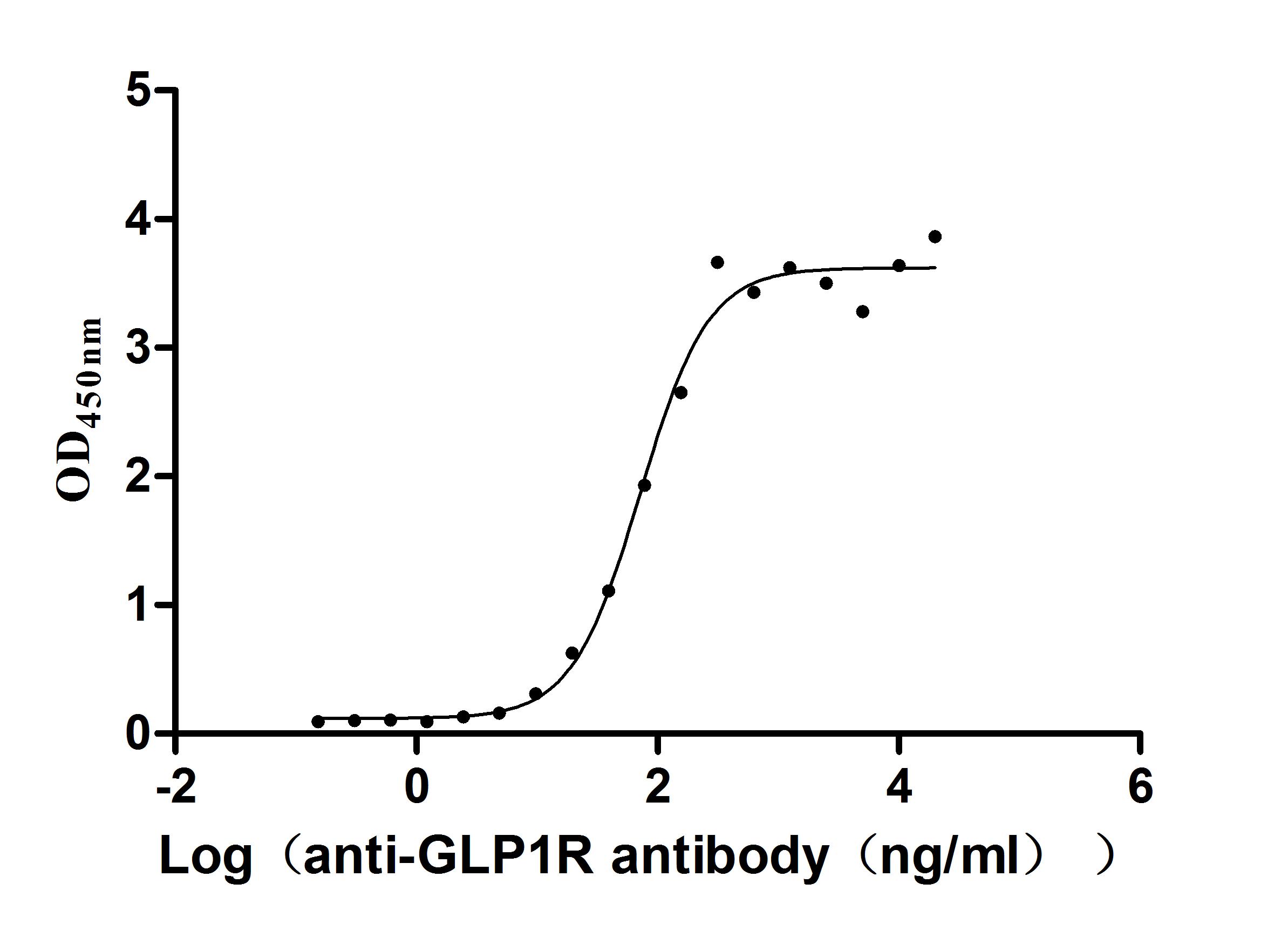Recombinant Mouse Receptor-type tyrosine-protein phosphatase O (Ptpro), partial
-
中文名稱:小鼠Ptpro重組蛋白
-
貨號(hào):CSB-YP019061MO
-
規(guī)格:
-
來源:Yeast
-
其他:
-
中文名稱:小鼠Ptpro重組蛋白
-
貨號(hào):CSB-EP019061MO
-
規(guī)格:
-
來源:E.coli
-
其他:
-
中文名稱:小鼠Ptpro重組蛋白
-
貨號(hào):CSB-EP019061MO-B
-
規(guī)格:
-
來源:E.coli
-
共軛:Avi-tag Biotinylated
E. coli biotin ligase (BirA) is highly specific in covalently attaching biotin to the 15 amino acid AviTag peptide. This recombinant protein was biotinylated in vivo by AviTag-BirA technology, which method is BriA catalyzes amide linkage between the biotin and the specific lysine of the AviTag.
-
其他:
-
中文名稱:小鼠Ptpro重組蛋白
-
貨號(hào):CSB-BP019061MO
-
規(guī)格:
-
來源:Baculovirus
-
其他:
-
中文名稱:小鼠Ptpro重組蛋白
-
貨號(hào):CSB-MP019061MO
-
規(guī)格:
-
來源:Mammalian cell
-
其他:
產(chǎn)品詳情
-
純度:>85% (SDS-PAGE)
-
基因名:Ptpro
-
Uniprot No.:
-
別名:Ptpro; GLEPP1; Ptpn15; PTPU2; Receptor-type tyrosine-protein phosphatase O; R-PTP-O; EC 3.1.3.48; Glomerular epithelial protein 1; Protein tyrosine phosphatase U2; PTP-U2; PTPase U2
-
種屬:Mus musculus (Mouse)
-
蛋白長度:Partial
-
蛋白標(biāo)簽:Tag?type?will?be?determined?during?the?manufacturing?process.
The tag type will be determined during production process. If you have specified tag type, please tell us and we will develop the specified tag preferentially. -
產(chǎn)品提供形式:Lyophilized powder
Note: We will preferentially ship the format that we have in stock, however, if you have any special requirement for the format, please remark your requirement when placing the order, we will prepare according to your demand. -
復(fù)溶:We recommend that this vial be briefly centrifuged prior to opening to bring the contents to the bottom. Please reconstitute protein in deionized sterile water to a concentration of 0.1-1.0 mg/mL.We recommend to add 5-50% of glycerol (final concentration) and aliquot for long-term storage at -20℃/-80℃. Our default final concentration of glycerol is 50%. Customers could use it as reference.
-
儲(chǔ)存條件:Store at -20°C/-80°C upon receipt, aliquoting is necessary for mutiple use. Avoid repeated freeze-thaw cycles.
-
保質(zhì)期:The shelf life is related to many factors, storage state, buffer ingredients, storage temperature and the stability of the protein itself.
Generally, the shelf life of liquid form is 6 months at -20°C/-80°C. The shelf life of lyophilized form is 12 months at -20°C/-80°C. -
貨期:Delivery time may differ from different purchasing way or location, please kindly consult your local distributors for specific delivery time.Note: All of our proteins are default shipped with normal blue ice packs, if you request to ship with dry ice, please communicate with us in advance and extra fees will be charged.
-
注意事項(xiàng):Repeated freezing and thawing is not recommended. Store working aliquots at 4°C for up to one week.
-
Datasheet :Please contact us to get it.
靶點(diǎn)詳情
-
功能:Possesses tyrosine phosphatase activity. Plays a role in regulating the glomerular pressure/filtration rate relationship through an effect on podocyte structure and function.
-
基因功能參考文獻(xiàn):
- Using loss-of-function and gain-of-function approaches, we show that PTPRO promotes the formation of excitatory synapses PMID: 28871037
- PTPROt thus functions as an obligate haploinsufficient TS in CLL, where its expression levels determine its role as a promoter or inhibitor of the tumorigenic process in mice. Partial loss of PTPROt generates the strongest disease phenotype, suggesting that its intermediate expression levels in CLL are selected for. PMID: 28166196
- TLR4 and NF-kappaB/p65 phosphorylation was significantly enhanced in PTPRO over-expressing cells, while significantly down-regulated in PTPRO knockout cells. PTPRO plays ital roles in atherosclerosis (AS) via promoting ox-LDL induced oxidative stress and cell apoptosis through TLR4/NF-kappaB pathway. PMID: 28578349
- PTPRO plays an important role in FH by interacting with TLR4. PMID: 26303994
- Study show that EphA4 is a substrate for PTP-oc in osteoclasts and that the molecular mechanism contributing to the PTP-oc-induced up-regulation of the osteoclast activity in part involves its dephosphorylation and inactivation of the EphA4 signaling. PMID: 25676701
- PTPRO truncated serves as an important tumor suppressor in hepatocellular carcinoma microenvironment. PMID: 26117839
- The loss of PTPRO in the tumor niche was correlated with larger tumor volume, more metastases, increased number of circulating tumor cells, less apoptosis and reduced necrosis rates in the orthotopic mouse model of breast cancer. PMID: 25646811
- PTPRO regulates insulin and lipid metabolism via the PI3K/Akt/MDM4/MDM2/P53 axis by affecting autophagy. PMID: 25826083
- PTPRO deficiency resulted in reduction of NF-kappaB activation in both hepatocytes and macrophages and was correlated to c-Src phosphorylation. PMID: 24128416
- These results suggest that ptpro is a target gene of Wnt/beta-catenin signaling and that PTPRO may function as a novel receptor for Wnt. PMID: 20804755
- Data indicate that PTPRO is required for peptidergic differentiation and process outgrowth of sensory neurons, as well as mature sensory function, and provide the first evidence that RPTPs regulate DRG development. PMID: 19800005
- PTPRO might participate in regulation of dendritic morphology or synapse formation of interneurons in the adult mouse olfactory bulb PMID: 19924828
- PTPRO is involved in the differentiation and axonogenesis of central and peripheral nervous system neurons, where it is in a position to modulate intracellular responses to neurotrophin-3 and/or nerve growth factor. PMID: 12532410
- We find that at least one NPCD isoform is tyrosine phosphorylated in vivo and can serve as a substrate for PTPRO in vitro. PMID: 15673668
- Ptpro moderates the amount of maximal activation of Eph receptors. In the chick retinotectal projection system, Ptpro controls the sensitivity of retinal axons to ephrins. PMID: 16680165
- PTP-oc is a positive regulator of osteoclasts PMID: 19244239
顯示更多
收起更多
-
亞細(xì)胞定位:Membrane; Single-pass type I membrane protein.
-
蛋白家族:Protein-tyrosine phosphatase family, Receptor class 3 subfamily
-
數(shù)據(jù)庫鏈接:
Most popular with customers
-
Recombinant Human E3 ubiquitin-protein ligase ZNRF3 (ZNRF3), partial (Active)
Express system: Mammalian cell
Species: Homo sapiens (Human)
-
Recombinant Macaca fascicularis CD93 molecule (CD93), partial (Active)
Express system: Mammalian cell
Species: Macaca fascicularis (Crab-eating macaque) (Cynomolgus monkey)
-
Recombinant Human Glucagon-like peptide 1 receptor (GLP1R), partial (Active)
Express system: Mammalian cell
Species: Homo sapiens (Human)
-
Recombinant Human Tomoregulin-2 (TMEFF2), partial (Active)
Express system: Mammalian cell
Species: Homo sapiens (Human)
-
Recombinant Macaca fascicularis Dipeptidase 3(DPEP3) (Active)
Express system: Mammalian cell
Species: Macaca fascicularis (Crab-eating macaque) (Cynomolgus monkey)
-
Express system: Mammalian cell
Species: Homo sapiens (Human)
















